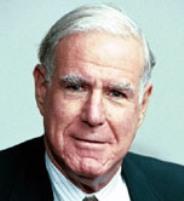The HCFO program ended in December 2016.
This site will no longer be updated, and some elements may not appear correctly.
Henry J. Aaron, Ph.D.

Henry J. Aaron, Ph.D., is the Bruce and Virginia MacLaury Senior Fellow in the Economics Studies Program at the Brookings Institution. In addition to being a member of the Institute of Medicine and the American Academy of Arts and Sciences, Dr. Aaron serves as a member of the board of directors for Abt Associates and the Center for Budget and Policy Priorities. He is a member of the visiting committee of the Harvard Medical and Dental Schools and has served on the visiting committee of the Harvard Department of Economics. Dr. Aaron's research domains include social security, tax and budget policy, and health care financing reform. In the health care field specifically, Dr. Aaron's research focuses on health care costs, financing, rationing, and public programs, including Medicare and Medicaid.
Dr. Aaron holds an M.A. in Russian Regional Studies and a Ph.D. in economics from Harvard University, and a B.A. in political science and economics from the University of California, Los Angeles. He has worked at the Brookings Institution most of the time since 1967 and taught economics at the University of Maryland from 1967 through 1989. In 1977 and 1978, he served as Assistant Secretary of Planning and Evaluation at the Department of Health, Education, and Welfare and, in 1979, chaired the Advisory Council on Social Security. He was later a founding member, vice president, and board chair of the National Academy of Social Insurance
In 2006, Dr. Aaron completed HCFO-sponsored research that examined whether rationing was necessary to control health care spending. With this grant, Dr. Aaron updated his 1984 book, The Painful Prescription: Rationing Health Care, that compared health care in the United States to that of Great Britain. At the time, the United States found the concept of rationing, which was already practiced in Great Britain, inconceivable. Dr. Aaron chose new interventional and diagnostic radiology and coronary artery disease technologies to test the premises asserted in his original publication and to compare the provision and use of these technologies in the United States and Great Britain. He found that U.S. physicians used more of these medical services, sometimes with little added value, than do physicians in Great Britain. Moreover, U.S. physicians tended to prescribe a greater number of high-cost interventions when low-cost interventions were equally appropriate.
To combat rising health costs, U.S. policymakers may consider rationing as a solution. As evidenced by planning administrators in Great Britain, however, efficient rationing is challenging because it is difficult to estimate the value of medical technology. Dr. Aaron notes, "Intelligent health care rationing-limiting the availability of care that costs society more to produce than it is worth to patients-is not a horror to be avoided. It's a regretfully necessary limit to sustain fair access to health care that is worth what it costs."
Two policy briefs, Treatment of Coronary Artery Disease: What Does Rationing Do? and Health Care Rationing: What it Means, the book, Can We Say No? The Challenge of Health Care Rationing co-authored by Dr. Aaron, and the article "Health Care Rationing: Inevitable but Impossible" (Georgetown Law Journal. January 2008) resulted from this HCFO project.
For more information about Dr. Aaron and a list of publications, please visit
www.brookings.edu/experts/aaronh.aspx.
